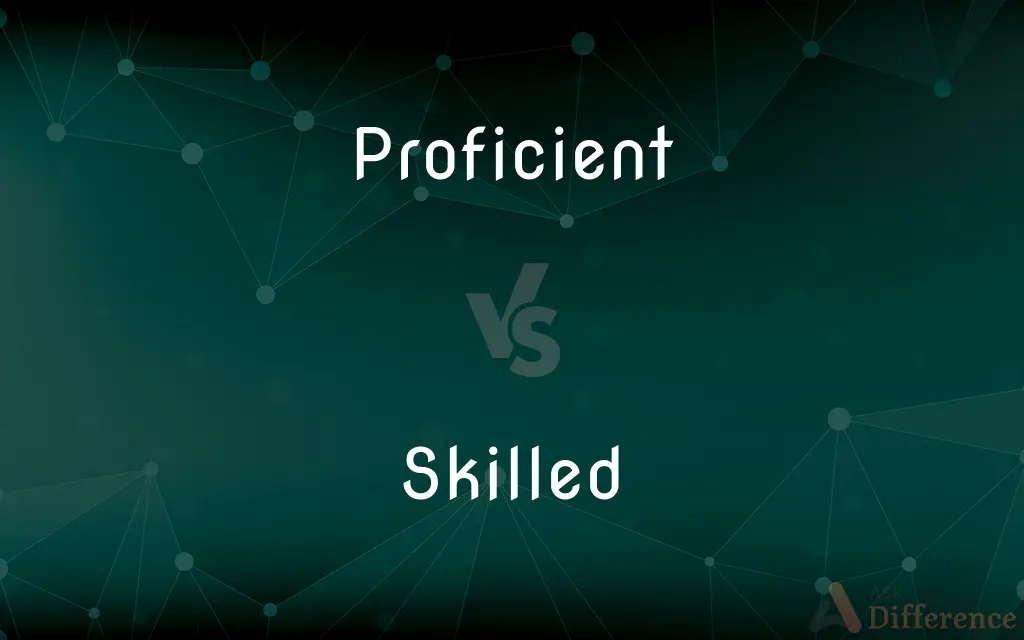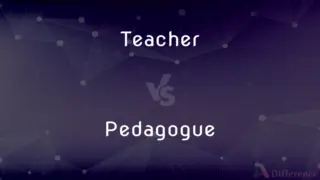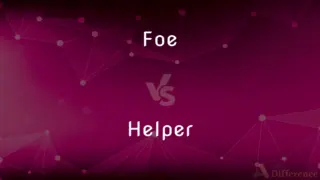Proficient vs. Skilled — What's the Difference?
Edited by Tayyaba Rehman — By Fiza Rafique — Updated on November 2, 2023
Proficient implies mastery and comfort in a skill, while skilled denotes having the ability or training to perform well.

Difference Between Proficient and Skilled
Table of Contents
ADVERTISEMENT
Key Differences
Proficient means having advanced knowledge or education in a particular field, showing a high degree of competence. Skilled refers to having the technical or practical abilities to do something very well, often acquired through experience.
Being proficient suggests a level of expertise that enables a person to execute tasks with confidence and efficiency. Someone who is skilled has honed their abilities through practice and application, which may not necessarily imply theoretical knowledge.
A proficient individual can handle complex tasks with ease and adapt to new situations due to their comprehensive understanding. A skilled person, on the other hand, can be highly effective in executing specific tasks they are trained for, often with a focus on manual or practical activities.
In professional contexts, a proficient worker is often someone who can take on and manage a variety of tasks or projects due to their broad competence. Whereas, a skilled worker is typically someone who excels in a particular trade or craft, demonstrating a high level of proficiency in practical skills.
The proficiency is often associated with intellectual capabilities or the ability to navigate complex ideas effectively, while skilled labor is often more associated with physical tasks, craftsmanship, and the application of hands-on techniques.
ADVERTISEMENT
Comparison Chart
Definition
Highly competent; mastery of a subject
Possessing abilities in a specific area
Focus
Knowledge and comfort in a skill
Ability or training to perform
Associated With
Mastery, expertise, education
Practice, experience, craftsmanship
Use
Often used in academic or knowledge-based contexts
Commonly used in practical or trade-based contexts
Implication
Can suggest a broader understanding
May imply specialized, hands-on proficiency
Compare with Definitions
Proficient
Competent or skilled in doing or using something.
She is proficient in multiple programming languages.
Skilled
Possessing specialized techniques or expertise in a particular field.
Skilled negotiations led to a successful contract signing.
Proficient
Well-advanced in an art, occupation, or branch of knowledge.
He is proficient in the art of negotiation.
Skilled
Able to do something well; expert.
She is skilled in French pastry making.
Proficient
Demonstrating a high level of performance in a subject.
The technician is proficient with the latest diagnostic equipment.
Skilled
Demonstrating proficiency in a craft or trade.
The skilled electrician fixed the complex wiring issue swiftly.
Proficient
Showing a high degree of skill; expert.
Her proficiency in chess has won her many tournaments.
Skilled
Having practical experience and expertise in a particular activity.
He’s very skilled at managing team projects.
Proficient
Possessing expertise or skill derived from training.
As a proficient editor, she rarely misses a grammatical error.
Skilled
Having or showing the knowledge, ability, or training to perform a certain activity or task well.
A skilled carpenter crafted the beautiful staircase.
Proficient
Competent or skilled in doing or using something
I was proficient at my job
She felt reasonably proficient in Italian
Skilled
Test
Proficient
A person who is proficient
He became a proficient in Latin and Greek
Skilled
Having or showing the knowledge, ability, or training to perform a certain activity or task well
A lab technician skilled in electronics
Skilled draughtsmen
Proficient
Having or marked by an advanced degree of competence, as in an art, vocation, profession, or branch of learning.
Skilled
Having or showing skill; expert.
Proficient
A person who exhibits such competence; an expert.
Skilled
Requiring specialized ability or training
A skilled trade.
Proficient
Good at something; skilled; fluent; practiced, especially in relation to a task or skill.
He was a proficient writer with an interest in human nature.
Skilled
Having or showing skill; skillful.
Proficient
An expert.
Skilled
Requiring special abilities or training.
Proficient
One who has made considerable advances in any business, art, science, or branch of learning; an expert; an adept; as, proficient in a trade; a proficient in mathematics, music, etc.
Skilled
Simple past tense and past participle of skill
Proficient
Well advanced in any branch of knowledge or skill; possessed of considerable acquirements; well-skilled; versed; adept,
Skilled
Having familiar knowledge united with readiness and dexterity in its application; familiarly acquainted with; expert; skillful; - often followed by in; as, a person skilled in drawing or geometry.
Proficient
Having or showing knowledge and skill and aptitude;
Adept in handicrafts
An adept juggler
An expert job
A good mechanic
A practiced marksman
A proficient engineer
A lesser-known but no less skillful composer
The effect was achieved by skillful retouching
Skilled
Having or showing or requiring special skill;
Only the most skilled gymnasts make an Olympic team
A skilled surgeon has many years of training and experience
A skilled reconstruction of her damaged elbow
A skilled trade
Common Curiosities
Is being proficient better than being skilled?
Not necessarily; it depends on the context. Proficiency is more about knowledge, while skill is about practical application.
What defines someone as skilled?
Someone is skilled if they have the training and ability to perform tasks well, often in a specific trade.
What does it mean to be proficient?
To be proficient means to have a high level of knowledge or skill in a particular area.
Can someone be skilled without being proficient?
Yes, someone can be skilled through practice without having comprehensive knowledge, which proficiency implies.
Are proficiency and skilled interchangeable?
They can be in some contexts, but they have different connotations.
Are skilled workers in demand?
Yes, skilled workers, especially in trades, are often in high demand.
Can proficiency be gained quickly?
Proficiency typically requires time and dedication to develop.
Can a proficient person always perform a skilled task?
Not always; proficiency implies knowledge which may not translate to practical skills.
Is it possible to be skilled in theory?
Skilled usually refers to practical abilities rather than theoretical knowledge.
Can proficiency be measured?
Proficiency is often measured through tests or certifications that assess knowledge or competence.
Does proficiency require formal education?
Proficiency often comes from formal education, but it can also be self-taught.
What is skilled labor?
Skilled labor refers to work that requires specific training or skills.
How do you demonstrate you are skilled?
Skilled individuals often demonstrate their abilities through their workmanship or performance.
Does being proficient mean you are an expert?
Proficiency suggests a level of expertise but doesn't necessarily mean you are the top authority.
How can I become proficient or skilled?
Through education and training for proficiency, and practice and experience for skills.
Share Your Discovery

Previous Comparison
Teacher vs. Pedagogue
Next Comparison
Foe vs. HelperAuthor Spotlight
Written by
Fiza RafiqueFiza Rafique is a skilled content writer at AskDifference.com, where she meticulously refines and enhances written pieces. Drawing from her vast editorial expertise, Fiza ensures clarity, accuracy, and precision in every article. Passionate about language, she continually seeks to elevate the quality of content for readers worldwide.
Edited by
Tayyaba RehmanTayyaba Rehman is a distinguished writer, currently serving as a primary contributor to askdifference.com. As a researcher in semantics and etymology, Tayyaba's passion for the complexity of languages and their distinctions has found a perfect home on the platform. Tayyaba delves into the intricacies of language, distinguishing between commonly confused words and phrases, thereby providing clarity for readers worldwide.















































